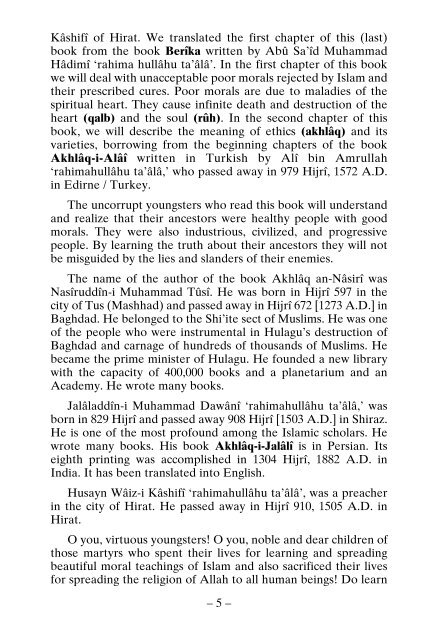Ethics of Islam
Ethics of Islam is taken from the book Berîka by Muhammad Hâdimi. Immorality and ways to get rid of it; 40 depravities and cures to them; usefulness of ethics; what is a soul; strengths of a soul; Personalities emanating from wisdom, courage, chastity and justice are extensively explained.
Ethics of Islam is taken from the book Berîka by Muhammad Hâdimi. Immorality and ways to get rid of it; 40 depravities and cures to them; usefulness of ethics; what is a soul; strengths of a soul; Personalities emanating from wisdom, courage, chastity and justice are extensively explained.
Create successful ePaper yourself
Turn your PDF publications into a flip-book with our unique Google optimized e-Paper software.
Kâshifî <strong>of</strong> Hirat. We translated the first chapter <strong>of</strong> this (last)<br />
book from the book Berîka written by Abû Sa’îd Muhammad<br />
Hâdimî ‘rahima hullâhu ta’âlâ’. In the first chapter <strong>of</strong> this book<br />
we will deal with unacceptable poor morals rejected by <strong>Islam</strong> and<br />
their prescribed cures. Poor morals are due to maladies <strong>of</strong> the<br />
spiritual heart. They cause infinite death and destruction <strong>of</strong> the<br />
heart (qalb) and the soul (rûh). In the second chapter <strong>of</strong> this<br />
book, we will describe the meaning <strong>of</strong> ethics (akhlâq) and its<br />
varieties, borrowing from the beginning chapters <strong>of</strong> the book<br />
Akhlâq-i-Alâî written in Turkish by Alî bin Amrullah<br />
‘rahimahullâhu ta’âlâ,’ who passed away in 979 Hijrî, 1572 A.D.<br />
in Edirne / Turkey.<br />
The uncorrupt youngsters who read this book will understand<br />
and realize that their ancestors were healthy people with good<br />
morals. They were also industrious, civilized, and progressive<br />
people. By learning the truth about their ancestors they will not<br />
be misguided by the lies and slanders <strong>of</strong> their enemies.<br />
The name <strong>of</strong> the author <strong>of</strong> the book Akhlâq an-Nâsirî was<br />
Nasîruddîn-i Muhammad Tûsî. He was born in Hijrî 597 in the<br />
city <strong>of</strong> Tus (Mashhad) and passed away in Hijrî 672 [1273 A.D.] in<br />
Baghdad. He belonged to the Shi’ite sect <strong>of</strong> Muslims. He was one<br />
<strong>of</strong> the people who were instrumental in Hulagu’s destruction <strong>of</strong><br />
Baghdad and carnage <strong>of</strong> hundreds <strong>of</strong> thousands <strong>of</strong> Muslims. He<br />
became the prime minister <strong>of</strong> Hulagu. He founded a new library<br />
with the capacity <strong>of</strong> 400,000 books and a planetarium and an<br />
Academy. He wrote many books.<br />
Jalâladdîn-i Muhammad Dawânî ‘rahimahullâhu ta’âlâ,’ was<br />
born in 829 Hijrî and passed away 908 Hijrî [1503 A.D.] in Shiraz.<br />
He is one <strong>of</strong> the most pr<strong>of</strong>ound among the <strong>Islam</strong>ic scholars. He<br />
wrote many books. His book Akhlâq-i-Jalâlî is in Persian. Its<br />
eighth printing was accomplished in 1304 Hijrî, 1882 A.D. in<br />
India. It has been translated into English.<br />
Husayn Wâiz-i Kâshifî ‘rahimahullâhu ta’âlâ’, was a preacher<br />
in the city <strong>of</strong> Hirat. He passed away in Hijrî 910, 1505 A.D. in<br />
Hirat.<br />
O you, virtuous youngsters! O you, noble and dear children <strong>of</strong><br />
those martyrs who spent their lives for learning and spreading<br />
beautiful moral teachings <strong>of</strong> <strong>Islam</strong> and also sacrificed their lives<br />
for spreading the religion <strong>of</strong> Allah to all human beings! Do learn<br />
– 5 –

















